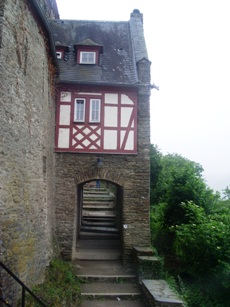Submitted by Ulrich Schrader on Sat, 2008-12-13 15:00
Wichtiger Bestandteil einer wissenschaftlichen Arbeit ist das Zitat. Hierbei wird auf dem Gedankengut anderer aufgebaut, dabei ist es wissenschaftlich guter und geforderter Stil, dass der Urheber des verwendeten Gedankenguts angegeben wird. Jemand, der die Arbeit eines Studierenden - Hausarbeit oder Thesis - beurteilen soll, bewertet es in der Regel immer positiv, wenn Zitate verwendet werden, sofern diese auf die übliche Weise kenntlich gemacht sind.
Submitted by Ulrich Schrader on Wed, 2008-11-26 11:14
Bei dem 6. Darmstädter E-Learning Tag an der TU Darmstadt zu dem Thema "OpenLearnware - Offene Bildungsressourcen für alle" konnte ich meine Erfahrungen mit verschiedenen Web 2.0 Anwendungen im Rahmen eines Vortrags "Offene Lehrveranstaltungen mit Web 2.0 Techniken" vorstellen.
Submitted by Ulrich Schrader on Sun, 2008-11-09 13:58
Submitted by Ulrich Schrader on Tue, 2008-11-04 18:08
I have to give a presentation next week on how and why I am sharing the content of my courses. To gather some ideas I have created a mindmap with some links and examples. You can follow this link: "Sharing course material", or use the embedded version. You can drag the image around using the mouse.
Submitted by Ulrich Schrader on Sat, 2008-07-12 10:47
Ich hatte die Gelegenheit anlässlich des eLearning-Praxisforums eine kleine Einführung in die Verwendung des Screencastings bei Vorlesungen und Vorträgen zu geben sowie meine bisherigen Erfahrungen vorzustellen. Eine gute Gelegenheit, dieses auch praktisch vorzuführen. Hier finden Sie die Aufzeichnungen und Folien:
Submitted by Ulrich Schrader on Tue, 2008-06-03 19:20
 Am 30./31. Mai 2008 fand der fraLine-Softskills-Workshop auf der von Dohlen bevölkerten Burg Stahleck im Weinort Bacharach statt.
Am 30./31. Mai 2008 fand der fraLine-Softskills-Workshop auf der von Dohlen bevölkerten Burg Stahleck im Weinort Bacharach statt.
Submitted by Ulrich Schrader on Wed, 2008-04-02 12:49
In the beginning Google started to offer a search engine for programming code. Now they are taking it even further. If you want to learn more about certain programming techniques or aspects of computer science, Google Code University might be a place you would like to visit. On this side they provide tutorials and link to course content related to current computing technologies. While the emphasis is on web-based technologies other topics are also covered.
Submitted by Ulrich Schrader on Tue, 2008-02-12 14:29
This report gives a very interesting overview of the current state and possible trends in open educational practices and resources. The report was compiled by the "Open e-Learning Content Observatory Services (OLCOS)" project funded by the European Commission.
One of the important messages of the report is that educational practices have to change considerably in order to make the best use of open educational resources. Barriers identified in the report include:
Submitted by Ulrich Schrader on Mon, 2007-04-30 17:39
Submitted by Ulrich Schrader on Fri, 2007-03-16 16:49
Zunächst habe ich begonnen meine Vorlesungen mittels Camtasia Studio mitzuschneiden. Dabei wird ein sogenannter Screencast erzeugt. Beschränkt man sich auf das Audiosignal, so erhält man eine MP3-Audiodatei, die als Podcast vertrieben werden kann.
Pages

